COVER- Tuneville

As a way of reviewing the year in music, The Hook invited a small horde of experts to get together and appraise some of the more intriguing record releases. Drunk with power, they agreed, and delivered a combination of biting invective and gushing praise that we then took to the musicians, who got to fire back with a bit of experimental meta-criticism. You know you're sick of Dave Matthews anyway.
Meet the panel

Stephen Barling
Readers might be surprised to learn that mild-mannered Stephen Barling moonlights as one of the most potty-mouthed motherf*ckers in town. B.C.– his duo collaboration with cellist Brandon Collins– has a weekly residency at Miller's and an album called (we are not making this up) Puberty and Justice For All.
You know, on second thought, scratch that completely. Mild-mannered Stephen Barling is actually not really mild-mannered, even in offstage mode: from the late '90s through late 2001, he wrote under an ultimately ineffective pseudonym ("Cripsy Duck") for a weekly music roundup, insightfully but mercilessly wrecking musicians all over town– no matter how many drugs he had taken before the show.
Finally, the legend rides again.

Jack Gray
Jack Gray graduated from James Madison University in 2004 with a degree in English. Others with similar credentials may have been destined for the life of a starving artist, but within two years Gray was hand-picked by local studio owner Kevin McNoldy to work at Crystalphonic, the $5 million, ultra high-end facility he built out on Preston Avenue. Following a flurry of staff changes and McNoldy's August 2005 move to Florida to expand the business, Gray finds himself flying solo at the $5 million Virginia facility, juggling the roles of audio engineer, producer, and businessman.

Bruce Flohr
RCA Records mascot "Nipper" may be the top dog in that label's hierarchy, but Bruce Flohr might have been a close second. After 16 years at RCA, he ended up as senior vice president of the company's A&R, living the L.A. entertainment biz dream and working with '90s rock megastars like the Foo Fighters and Lit. By 2003, he'd had enough and moved to Charlottesville to work with Red Light and ATO Records; here, he's definitely top dog.

Matt Willner
Matthew Willner might just be the hardest working musician in town. He didn't start playing guitar until he was almost 18, and these days it seems like he wants to make up for lost time. After fronting a number of bands through the years – Replicant, Full Flavor, and Plutonium among them – he quit his long string of manual labor and restaurant jobs two years ago to professionally rock his way through life. These days fans can find him playing with one of his zillion projects three or more nights a week. Some say that it takes a tremendous stroke of luck to make it as a musician, but Willner is out to prove that sweat and elbow grease can do the trick as well.

Jaz Tupelo
Jaz Tupelo has held pretty much every music-related job in the book– retail music stores, concert venues, writing reviews, and now DJ'ing on the radio. After beginning as a volunteer at WNRN five years ago, she's made a steady climb up the station's ladder. She was arguably the perfect specimen for The Hook's expert panel: as WNRN's music director, Tupelo hosts similar meetings with the station's other DJs which ultimately lead to the final programming decisions.
CRITIQUES
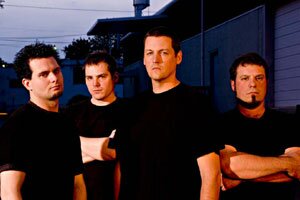
Sickshot
Sickshot sprang from the remnants of My Dog Lucy following the exit of Brian Craddock and Shepard Stacy. Craddock had been working with local producer Kevin Murphy and soon brought him into the fold as a drummer. Ultimately, they were unable to escape their backgrounds as professional record producers– Sickshot evolved into an ultra-polished hard-rock project, and the debut album, called simply {1}, has no shortage of digital effects processing.
"The goal is to be as successful as we can be as a group," says bassist Drew Worsley. That's why they're making a serious bid for a major label contract– their astonishingly high-end press kit describes the project as "a sonic standpoint filling the void left in today's music market with its pounding, complex rhythms and powerful, soaring melodies."
"When we're approaching major labels, we're trying to keep everything in-house," continues Worsley. "We'd like to be financially successful, but self contained."
Willner: "Filling the void in today's music market?" I don't know...
Tupelo: They have the formula down.
Willner: Soundgarden did something similar, but they did it 10 years ago. Now it's kind of tired. It's better than Creed. I thought the effects were good.
Cripsy: I'm not a producer, but I think they did a good job.
Gray: See, I didn't like that. It's like, "Oh, we're stopping. And now we're starting." The production kind of got in the way– you're paying more attention to the filters and the effects.
Flohr: These guys are really doing the music they love to do. You're not going to read about them down the road after they break up and one guy is playing in a jamband and another is doing alt-country.
Cripsy: It's the music that's being made by 20-year-olds.
Willner: Yeah, and listened to by 14-year-olds. Supposedly it's really hard, but it's pop. Very commercial.
Flohr: These guys should be the champions of their local rock scene. If I was 16 and wanted to go out and see good music, I would go see these guys.
Bassist Drew Worsley replies:
This band was put together to make it. We want that MTV demographic that's 13 to 21 right now. Those are the kids who buy your merchandise at the shows and take the time to learn all the words. Those are the people who spend money on music these days; it's not the older people. If you go to something like Ozzfest or the Warped Tour, everyone is going to be between 16 and 20 years old.
We're huge fans of that type of music: A Perfect Circle, Tool– and although I don't want to say that we're influenced by them, in terms of having a formula– Nickelback. None of us would ever go out and buy any of their records, but they've found a formula that works for them and are making bank.

Devon
Devon Sproule's recent albums have veered away from the mainstream sound she once flirted with, back toward rootsy folk and light rock. Keep Your Silver Shined also reflects recent developments in her personal life: last May, Sproule and fellow musician Paul Curreri finally tied the knot, resulting in a very high songwriter-per-capita ratio at their house.
"The whole record has this 'experimenting with domestic' feel," she says. "My life feels pretty domestic, except for traveling– being married, renting a house, having a garden, making dinner a lot. I think we'd have a dog if we didn't travel for a living."
Overall, it's been a musically liberating experience. "Paul asking me to marry him gave me this amazing feeling where I could really turn all my attention to writing and being a good performer," she says. "Taking care of that part of my life gave me a foundation for getting this done."
Gray: The only thing I didn't really like was the mix. The tones are great, and the mix of the band was great– it's easy to screw that stuff up– but if you're going for a roomy sort of sound, the vocals seem a little loud.
Willner: But then in the singer-songwriter thing, it's all about the vocals and the lyrics.
Cripsy: It's a very angular songwriting style. She's not afraid to go in a direction you're not expecting.
Tupelo: And the vocals follow that style. It's not virtuosic just for the sake of doing it, but she can do it, and she does go there.
Cripsy: She's going at this whole country songwriter thing pretty hard.
Willner: She seems to lack self-consciousness; she's really willing to put anything out. She feels comfortable writing whatever she feels like– almost to a fault, but it's also really sweet in a way.
Tupelo: I remember her back when she was doing the seven-minute narratives. I like this stuff better because it moves a little better, and it keeps me awake.
Cripsy: It's very laid back. It's not going to go over so well in the mainstream national press, but the alt-country people are going to love it.
Flohr: Devon doesn't have to do anything but sit back and wait for the right person to come champion her sound and present her to the world– a person like the one who saw the talent in Norah Jones. That's all she needs to be the next big thing.
Willner: This is the first one where I've noticed the lyrics.
Tupelo: The lyrics make me want to hug her.
Devon replies:
Having both the ears of Jeff Romano and Bobby Read really equaled out. I can't call myself a self-producer; I had to trust them. I agree with Jack in a way, but also I agree with Stephen about wanting to get the vocals out there. My mom used to say, 'I don't want to see your hair in your face. I just want to see your face.' I feel like I have to cater to the moms of the world and put my voice out front.
I guess I've never really minded that the music doesn't cling to one genre, and I also don't mind that it doesn't cling to one production style. The biggest advantage of touring in the UK is that not all audiences have to have a specific genre title in order to go to a show, because of the way that music is promoted there. Because I'm not going for any big commercial uproar, I don't feel like I need to worry too much about genre. I think the person or company who champions it is going to have to relax their idea of the borders of genres. In that way, it's harder to know what to do with it. On the whole, I feel pretty marketable.

Thismeansyou
Thismeansyou makes no bones about the fact that their claim to fame is a heavy vocal style that– to put it bluntly– scares the bejesus out of everybody.
"I think I came up and screamed in the microphone once and they said 'You're hired,'" laughs imposingly bald singer Kim Dylla.
Last summer, they were finalists in the "Battle For Ozzfest" reality television show on MTV, a sort of "Death Metal Idol." With a backing band intent on keeping pace with Dylla's impressively unholy screeching, it's no wonder.
Following that adventure, they began work on Reviving The Apparently Dead. There's no firm release date, in part because they're looking to get it out through an as-yet-unsecured record deal, but in the meantime they have a partial sampler available.
Cripsy: Chick screamer– scary, very scary
Tupelo: That's so hot.
Cripsy: Not as hot as a chick bass player, but still pretty hot.
Willner: I'm ashamed that I like this. It's so cool.
Cripsy: What is that, the guttural banshee scream of eternal torment?
Willner: Wow, is that done through effects?
Gray: I don't hear anything.
Willner: I must be getting old. This would definitely piss me off if I was somebody's parent.
Gray: If you start at 100, there's nowhere to go but down. There are no dynamics. They're playing at 100 percent the entire time.
Tupelo: Kudos to the vocalist for doing a great job on a tough vocal style– but it was a bit much after a while.
Cripsy: The only message she was sending me is that she's not a good Christian girl.
Willner: You never know. Jesus might rock like that.
Flohr: The drummer on these songs is amazing. He gets the MVP award.
Vocalist Kim Dylla replies:
I am definitely not a good Christian girl.
Most of those screaming comments are pretty much par for the course. Me being a chick and screaming the way I do is definitely our gimmick. It seems to definitely get attention. Brandon is an excellent drummer, I'd agree with that. But not only do we have a great drummer, our guitarist can really shred as well. The screaming is the thing that most puts people off to metal, or to death metal in particular. They refer to it as "the growly screamy thing," and they don't listen to all the cool things that are going on with the guitar.
I feel like there are a lot of dynamics in our sound, but that's coming from me as a metal listener. We're always at 100 percent, but our amps go to 110 percent.

The Hackensaw Boys
Charlottesville's music scene rang in the new millennium by burping up the Hackensaw Boys, a bluegrass outfit that's equal parts quirky and brainy and has been through a number of substantial lineup changes in its day. Around this time last year, whatever configuration they were on at the time signed with Nettwerk Records, nailing down some serious distribution potential for Love What You Do, which dropped the following August. Since then, touring has been ambitious, and mainstream acceptance has been steadily climbing; "It really was something that gathered its own steam, and at some points I felt like I was on a ride instead of being the driver," says mandolin player Rob Bullington. They may not always be in complete control, but they seem to be headed in the right direction anyway.
Cripsy: Wow. That's not Robbie St. Ours' Hackensaw Boys.
Willner: I grew up listening to this stuff, so I kind of have a reverence for real bluegrass. When I hear the goofy tunes, it's kind of like cartoonifying Duke Ellington. It's coming from something really deep. But then again, I'm such a goofball. I'm the first one to play Foggy Mountain Breakdown on classical guitar with a fake banjo effect.
Cripsy: Real purty David Sickmen songs, but I miss 10 drunk weekend rednecks crooning in unison.
Willner: This is not new musical territory, but that's not the point. I'll bet this music is really fresh to people.
Cripsy: This is also better than Creed.
Willner: Can we look at something that's not Americana or metal?
Mandolin player Rob Bullington says:
They're having a fairly common experience with what the music is supposed to be versus what it is. We'll do a lot of bluegrass festivals where the old timers come up to us and say, "You guys don't play real bluegrass," and we say, "We never said we did." And then they say okay.
As for the 10 drunk screaming rednecks, I don't think we've ever been that. That may have been what we sounded like on any given night, but it's not what we were trying to be. By no means did we set out to try to recreate a Rascal Holcombe album. We're not purists. If we go open a show for Modest Mouse, 95 percent of the emo kids there think of it as bluegrass. But if we go play a show with Del McCoury, 95 percent of the gray-haired people think we're not playing bluegrass.
Quite frankly, I don't know who we've ever played to who would ever listen to what we do normally, aside from maybe your generic Americana guy at SXSW who compares us to The Gourds or to Old Crow Medicine Show. The people we normally play to either tell us that we're playing bluegrass or that we're not.
This is the first album we've ever done without Robbie being a part of the band. At one point there were 12 people in the band, and now there are six, and every one has been phenomenal and huge and a crisis. I can't imagine a month going by without a huge crisis in the world of the Hackensaw Boys. It wouldn't be normal.
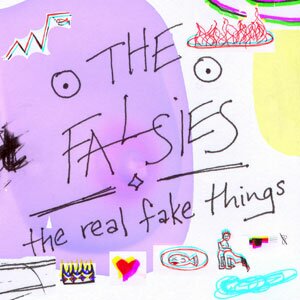
The Falsies
Singer Peter Markush relates the birth of the Falsies like a twisted bedtime story, a fable whose teller ends up just drunkenly yammering on about philosophy and Asian women. "The Falsies are really Lance's brainchild," he says. "Once upon a time, he decided he wanted to play drums in a band. He was just a beginner drummer. He also had all these songs he had written that were too ridiculous for the Naked Puritans. So he thought, 'How about I put together a band of novices?'"
Fairy tale or not, drummer Lance Brenner is suffering no delusions of grandeur here: "I'm not trying to be the best drummer in the world," he says." If I was, I'd have to kick myself out of my own band, and I wouldn't want to do that." It's a good thing, too– had he done so, he wouldn't have been able to deliver The Real Fake Things.
Flohr: Of all the groups we've heard, these guys could be the first to sell a million records with the right exposure– maybe a Claymation video.
Willner: How do you judge this? It's not about art, it's about entertainment.
Cripsy: Any way I'd describe this would start with "bad." Like, "It's really awesome bad pop."
Tupelo: I like it. I'm not going to play it, but I like it.
Willner: They're tighter on the record than they are live. Probably because they're not drinking.
Cripsy: The drummer is better than Robert Jospé. But not as good as Creed.
Willner: On a scale of Creed to Britney, I give it a Jessica Simpson.
Gray: I give it a ten ton zero.
Vocalist Peter Markush replies:
So many people have said to me that we are really refreshing because we don't take ourselves seriously. But at the same time, we're not a joke. Hopefully the songs have some merit and the performances aren't unlistenable.
No comment on the drinking thing. Oh, okay. Of course, it's accurate.
"Drummer" Lance Brenner replies:
Stephen Barling is starting to get it. The goal that I originally set out for us was to be the best worst band that anyone would actually stay to listen to. There's dumb dumb and there's smart dumb, and we play the smart dumb pretty well. Most of the time.
Bruce, I'll bring the clay, you bring the record deal. My phone number is 434-249-3991.
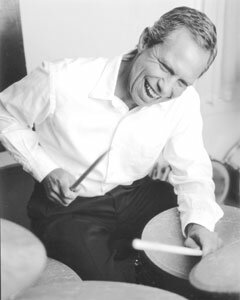
Robert Jospé
Robert Jospé rolled into town in 1981 as part of jazz powerhouse Cosmology and began cranking out albums for real after slyly dominating the local scene for some 15 years. Another 10 years or so later, he has rolled out Heart Beat, his new album with the Inner Rhythm ensemble.
The album was recorded at Haunted Hollow, the private studio owned by the Dave Matthews Band. "It was a great inspiration, having that place to record in," he says. "I feel like the music reflects that. I've never felt more comfortable in a studio than I have out there."
With this album, he was trying to capture the idiosyncratic mix of performers and styles that his band comprises these days. "We wanted to go a little heavier with the percussion and the world influences," he says. In part, that's because he hopes to move the band out of clubs and onto the regional festival circuit.
Willner: I've listened to a lot of Latin jazz, so it's not original to me. Latin and bluegrass and blues– it's all traditional music, and there are rules. It's pretty straight ahead– there aren't any DJ's scratching.
Gray: I think the mix is a little thin. There aren't a lot of lows, and I wish there was more ambience. Everything's really small and close. It seems like rock guys mixing a jazz record. But the sax sounds great.
Willner: I think it's slightly lite. I bet live there'd be a lot more balls.
Cripsy: More high art jazz from Charlottesville's elite players.
Gray: If anything, it's very polite.
Tupelo: It's gorgeous, and it makes me yearn for warmer temperatures and fruity drinks.
Flohr: What's amazing about Charlottesville is you can go to a place like Rapture or Miller's and hear world-class music like this. That's why I came here.
Robert Jospé replies:
I really appreciate Bruce's comment that it's world class– and I believe that it is. Everyone playing on that record is at a really high performance level. These are live tracks; there aren't a lot of overdubs. All the tracks are live. Even Heather Maxwell's lead vocals are live, done with the band.
We were working in an environment that was not traditionally where this sort of music is recorded, but I mixed it with Chris Kress to the best of my ears, and I wanted a bit of a rock sound to it.
It's not a progressive statement on that first tune. There are a few pieces that go out a little further than that. "Kana Kasi" is a fusion of Afro-Cuban and West African rhythms. The verses are in an Afro-Cuban style, and then the choruses go into a much more West African 6/8 or 12/8. It's sung in English, but also in Bombara, a language spoken in West Africa. I don't think I've heard anyone singing in Bombura before. And the arrangement of "Mozambique," written by Emily Remler, is a very hip fusion– it goes into 6/4 and 4/4. It's pretty funky for an odd-time tune.
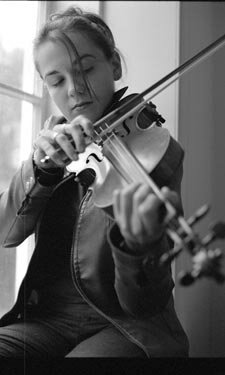
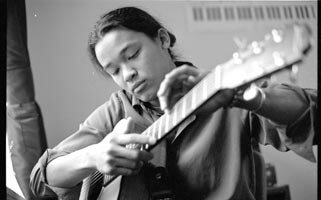
Jay Pun and Morwenna Lasko
Jay Pun and Morwenna Lasko's progressive acoustic music wasn't easily documented. The two recently graduated from the Berklee College of Music; the tuition gave them chops but also sucked their recording budget dry, so they decided on a homebrew approach for Etopia. "We searched around for a good studio and realized we couldn't afford it. We decided we could do just as good a job," says Pun. "We did everything– playing, recording, printing, artwork."
But when the time came to lay the final sonic details in place, they turned to a major player: both see Greenwood Studio wizard Jeff Romano as one of the most important bonding agents in the final product. "Jeff really put the frosting on our songs," says Lasko.
Cripsy: Well played, thoughtful modern ambient-acoustic sizzling fiddle.
Willner: I can really hear the bedroom studio. It's pushing mid-fi– but Morwenna sure can play.
Gray: She's very intimidating.
Willner: Morwenna is a badass.
Cripsy: I want to hear the violin through a nice microphone.
Flohr: I would like to hear them record a project in a studio where they can refine this. This sounds like a live recording.
Tupelo: I enjoyed them when I saw them live– they're really terrific performers.
Jay Pun says:
Morwenna can play fiddle, violin, all types of music. She's not just a fiddle player. Charlottesville is lucky to have her. I'm just trying to keep up.
I think the lo-fi thing is totally us. It's good to know that we did it all and we're not just some cookie-cutter band that has $20,000 or $50,000 to go into a studio. One day it's going to get better.
Morwenna Lasko says:
It's our first CD ever. For a first recording, we're shocked, we're in awe, we're elated at the effect that it's had on this town, and stretching across the U.S. People are buying it on CDBaby and wanting to hear more.
When you get down to it, it's the sound quality, it's not the writing or the quality of the playing. If we had the money to record in Crystalphonic, they could make us sound like a million dollars, but we don't have that kind of funding. You can't make a silk purse out of a sow's ear; we've got the homemade dress for the prom.
For the amount our budget let us work with, I think it's a pretty awesome recording. Some people really are lucky because they have somebody funding their record. Someone should step up here; someone out there has to want to be a part of this. Not that we think we deserve anything, but we believe in it– there are enough nutrients in what we're doing.
GENERAL DISCUSSION
Ultimately, we were unable to keep these nutcases under control– the panel discussion ricocheted wildly shortly after the beer showed up, and unfortunately some noteworthy releases of the past year dropped out of the discussion. But we were able to rein them in enough to get insightful collaborative reflections on the state of Charlottesville's music scene from some of the people most closely tied to it.
Gray: This is not the only representation of music in Charlottesville. This is by no means everything.
Willner: For some of the people out there, the album is not the point. They're just doing it because they love the music.
Cripsy: Also, if you go to the radio station and the paper, you're just begging to be judged.
Willner: But some people don't care about the approval. I've never put out an album. I have one, but I've never released it– I'm a perfectionist.
Harrison: That's the same reason Ezra Hamilton doesn't have an album.
Cripsy: Which is so f*cking stupid. He's so great.
Willner: Putting out a CD takes money. It's one thing to do it in your house and burn it on a CD from your computer– and even then you have to have a computer– and quite another to spend $5,000 to actually put it out.
Gray: And at the end of the day, someone like Jamal Millner needs a day job. That's the sad truth.
Willner: Half the time, the ones with the day jobs are the ones playing real music, because when you're trying to make money playing music, you end up trying to be a pop star.
Gray: But if a guy like Jamal can make money playing music, what's wrong with that?
Assar: Is it still possible to earn a living as a musician?
Willner: You can do it if you don't have a baby. I'm 34, and I don't have kids.
Gray: You're basically saying no at that point.
Willner: Yeah. Because America doesn't give a f*ck about the artists.
Gray: Well, let's say Charlottesville.
Willner: No, let's not.
Cripsy: Let's talk about raising the drinking age and its effect on middle class working musicians. Eighteen-year-olds are dumb and will pay five bucks to see someone play. By the time you're older, you're jaded.
Gray: Just because a certain musician is considered good doesn't give anybody else any obligation to give them money.
Willner: What's enough money? Plenty of people are happy to make $20,000 a year. If making music is more important to you than owning a Benz, then go make music.
Gray: It's unfortunate, but not everybody wants to pay the five bucks.
Willner: But we'll pay 30 bucks to go see some band from out of town at Starr Hill because they only come to town once in a while, because they're more of a commodity? But we won't go see someone who plays in town and is phenomenal?
Cripsy: I don't think Charlottesville is going to give a sh*t about anyone until they leave town.
Gray: Charlottesville makes a great hometown. It's a great place to come home to after you're done doing all this stuff elsewhere.
Crispy: Yeah, I think Charlottesville does have an issue with that.
Gray: Maybe just the market is flooded. I mean, how many venues are there? And they're opening a new jazz club? Maybe it's a reaction to the huge success of Dave Matthews. Maybe there's too much music, too many bands, too many venues.
Willner: Or too many people playing music for the wrong reasons.
Harrison: The musicians I know who came out of Athens say the same thing about the post-REM era.
Gray: I'm from Atlanta, and yeah, that's about right.
Cripsy: It's weird, though. The star eclipsed all of our heroes. Everyone here was worshipping Tim Reynolds and Greg Howard, but everyone else paid attention to Dave.
Willner: It was like, "Holy sh*t! John McLaughlin lives in our town!" And it still happens. Jeff Decker is a f*cking monster. John D'earth is amazing.
Cripsy: Johnny Gilmore's the best musician I've ever met in my life. And that's the truth.
Willner: You just have to stick with it for a really really long time. Keep going out and playing gigs. Understand that if bars aren't making money, it's not the end of the world.
Cripsy: Don't be too hard on yourself. Don't suddenly become embittered because you're not worth $100,000.
Willner: If you want money, go be an investment banker. Just keep doing it for a long time and become a bad motherf*cker, and if people are going to come along, they will.
#